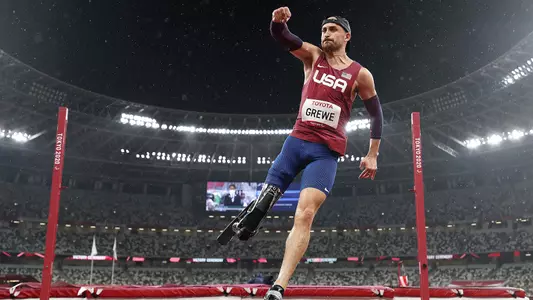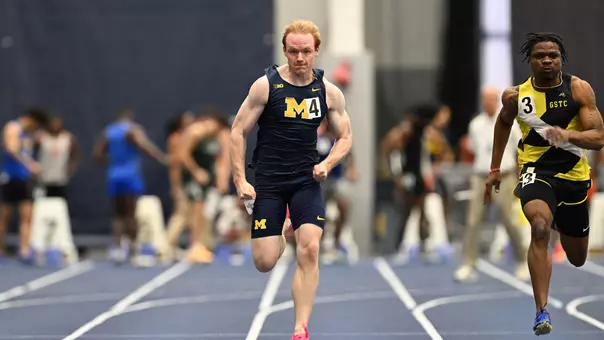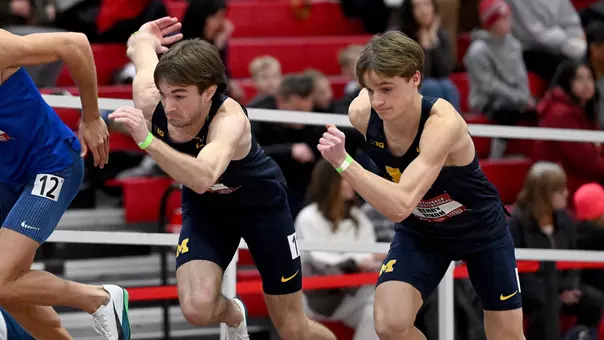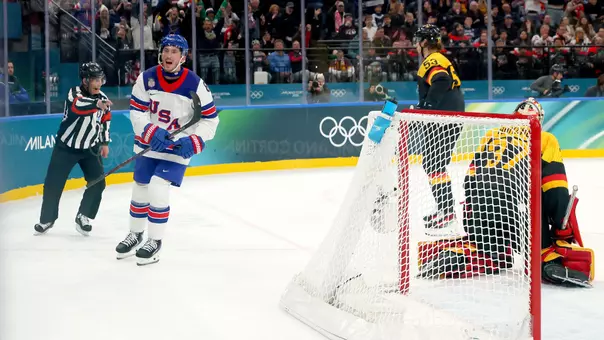
Conqu'ring Heroes: U-M Med Student Grewe Embraces 'Grind,' Wins Paralympic Gold
9/16/2021 9:00:00 AM | Men's Track & Field, Features, Olympics
On this week's edition of the "Conqu'ring Heroes" podcast, U-M medical student Sam Grewe discusses his decision to amputate his right leg in seventh grade, the process of transitioning to adaptive sports as a teenager, his memories from the day he won a Paralympic gold medal in the high jump, and his professional goals in the medical field. This interview was made possible thanks to Michigan Medicine and its "Michigan Answers Spotlight" feature on our Learfield radio broadcasts this season.
By Brian Boesch
Back in 2011, Sam Grewe was a typical seventh grader. He was a diligent student and an avid athlete without any significant medical issues. However, during his basketball season, Grewe began to experience sharp pain in his right knee. On Christmas Eve that year, Grewe and his family received the unfortunate results -- he had a fist-size tumor in his right leg.
Over the next two years, Grewe spent much of his time in the hospital, where he endured 21 chemotherapy sessions to try to battle past osteosarcoma. Ultimately, his doctors gave Grewe two options. He could go through a limb-salvage procedure to maintain his right leg, though the leg would not hold up well during most physical activities, or he could amputate the leg and eventually get back to some normalcy with his physical activity.
"I thought about the lifestyle that I had lived up until that point (and) the lifestyle that I wanted to live moving forward, and it became clear to me that going with limb salvage was not going to be compatible with that lifestyle," Grewe recalled on this week's edition of the "Conqu'ring Heroes" podcast. "At 13 years old, I made the decision, let's just cut the leg off."
It did take some time for Grewe to reclaim his busy athletic schedule, both because of the mental and physical transition and due to the lack of knowledge about adaptive sports. He did not know about the opportunities for those with disabilities for more than two years after his amputation. Once he began his high jump career, Grewe qualified for his first international event within seven months.
"On the track and off the track, I really embrace the grind," Grewe said. "I really like making a plan, subscribing to the plan, (and) holding myself accountable for that plan, for the sake of accomplishing my goals."
Grewe accomplished many goals on the international stage. He won gold in the 2015 and 2017 World Championships and the 2019 Parapan American Games. However, Grewe did have to settle for silver in the 2016 Paralympic Games in Rio de Janeiro.
After a longer-than-usual five-year wait, Grewe had another opportunity at gold in this summer's Paralympic Games. He qualified for Tokyo and had one more jump to attempt to best the 2016 gold medalist, India's Mariyappan Thangavelu. With torrential rain falling on a humid day in Tokyo, Grewe grazed the bar, but he did not knock it over. Grewe had won his long-awaited Paralympic gold.
"In the pouring rain, across the world, I had to get up to that line and kind of mentally recalibrate and convince myself to go and do the jump that I've done so many thousands of time before, when it really counts," Grewe remembered. "Once I started heading toward the bar, there was no doubt in my mind that I was going to clear it."
"Once (I saw) it stayed up, just the wave of emotions came over me because that's what I had worked towards for so many years," Grewe continued. "It really was a moment of joy, as well as relief."
Shiny head, shinier medal. #ShowTheWorld #TeamUSA #Paralympics #Tokyo2020 #WeThe15 #Gold #BeThe1 #DuesPaid #HighJump pic.twitter.com/PdvLE18mLt
— Sam Grewe (@samgrewe) September 2, 2021
Grewe has returned stateside and is in medical school here at the University of Michigan, trying to become the type of doctor that he did not encounter during his lengthy stays at the hospital a decade ago.
"I spent two years in the hospital, and I don't remember ever interacting with a health-care provider who had a disability," Grewe said. "I want to be able to point those patients that I see in a direction that is going to get their life on track and is going to really bring out the best in them, because that's what adaptive sports did for me."
As Grewe experiences the challenges of medical school, he will lean upon the important lessons from his life and, in particular, his high jump career.
"This sport -- it tries to tear you down. High jump is the most frustrating thing I have ever done, so I really do think that having the ability to stay mentally strong, to persevere, is going to be so important moving forward in medicine."










